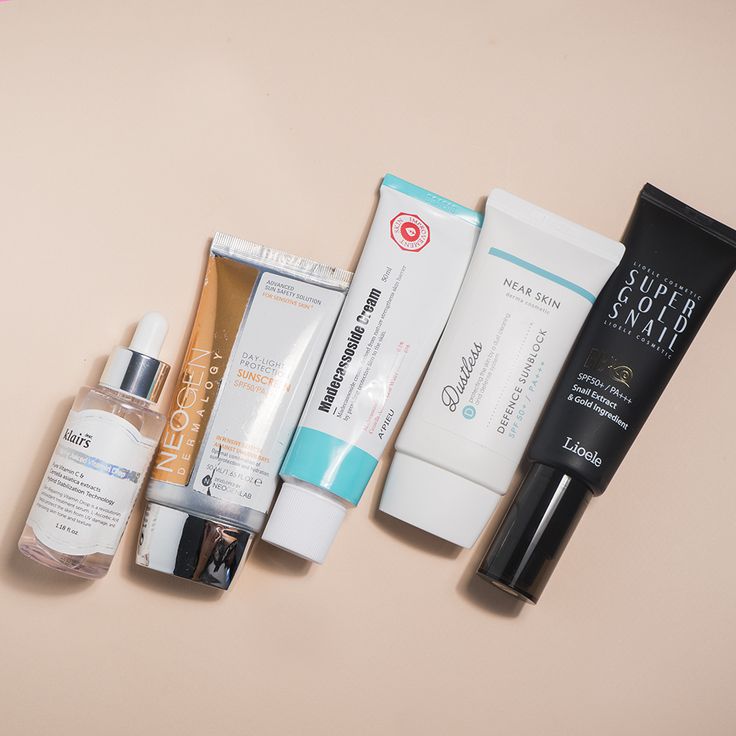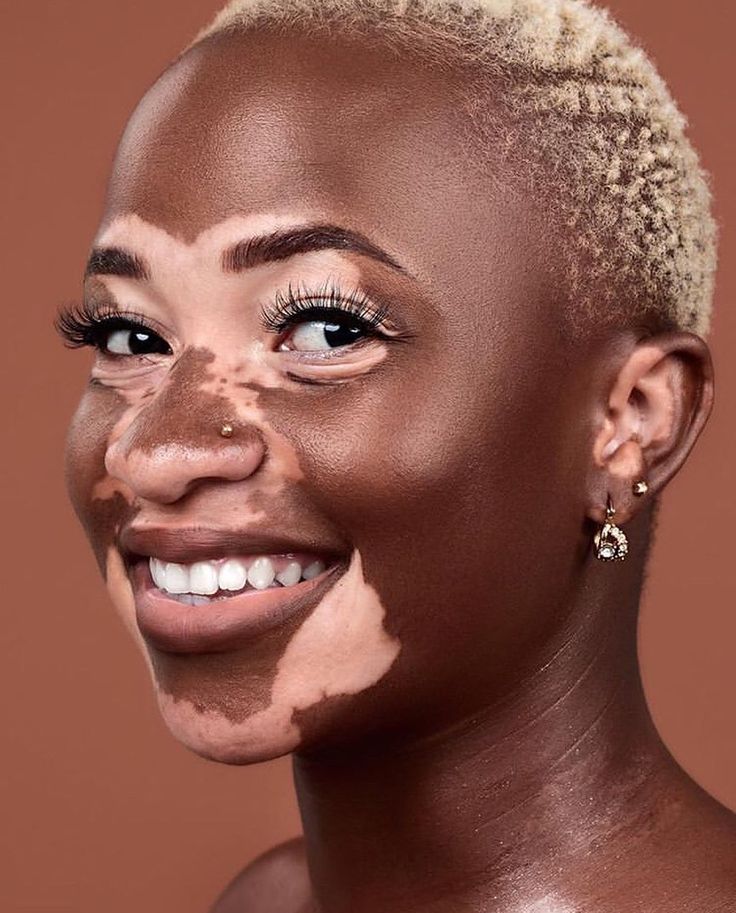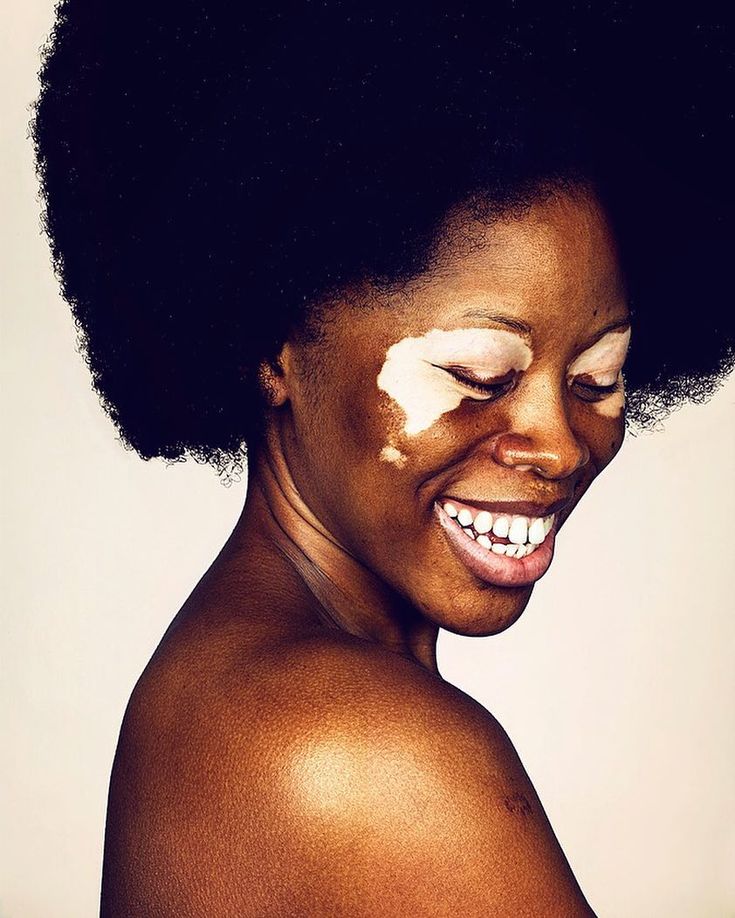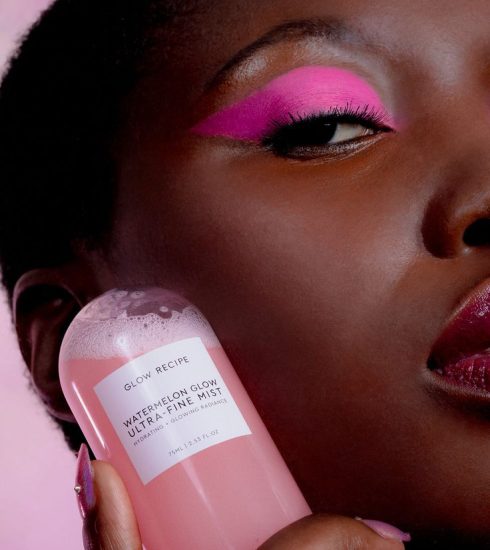Skincare Tips for Nurturing Vitiligo
-
Dorcas Akintoye

- August 14, 2024
Vitiligo is a skin disorder that depigments areas of the skin due to the loss of pigment-producing cells called melanocytes. Vitiligo can affect anywhere on the body; apart from that, it affects people of all ages, genders, and ethnicities. It’s crucial to think carefully about products and treatments applied to the skin of those with vitiligo. Skin damage might cause vitiligo in some situations, so avoiding activities that may harm the skin is crucial. This article will explore skincare routines tailored for people with vitiligo.

(1) MOISTURISE REGULARLY
Keeping the skin hydrated is crucial since vitiligo can make it dry and irritated. To moisturise and calm the skin, use a fragrance-free, non-irritating moisturiser. Naturally, it’s always a good idea to drink more water. The conventional wisdom of at least eight glasses daily is still valid.

(2) WEAR SUN PROTECTION
All skin types should use a small amount of SPF, but people suffering from vitiligo should use it even more. Skin becomes more vulnerable to sunburn and UV damage when its pigmentation fades because it no longer has as much natural defence against UV radiation. Therefore, it’s critical to protect all exposed skin, especially that which is affected, using sunscreen with at least SPF 30. Reapplying sunscreen is recommended every two hours and after swimming or sweating.

(3) DO NOT FORGET OTHER PARTS OF YOUR SKIN
Many people with vitiligo are guilty of not giving their other body parts enough attention, yet these parts do need love, too. For your lips, try looking for a lip balm that doesn’t contain artificial colouring, perfumes, or preservatives. This also applies to body lotion, which is a helpful product to have on hand. Additionally, you can use organic or all-natural ingredients to ensure that it is more suited for sensitive skin.

(4) AVOID HARSH CHEMICALS AND IRRITANTS
Aggressive chemicals and irritants in products can worsen vitiligo and severely harm the skin. Therefore, you should steer clear of harsh soaps, creams, exfoliants, and other skin care products.

(5) KEEP A HEALTHY DIET
Maintaining healthy skin is not only about what’s on the outside; nutrition also plays a significant role. However, because vitiligo is an autoimmune condition, the immune system can greatly benefit from a nutritious diet rich in various fruits and vegetables. Furthermore, vitamin deficiencies can be checked to make sure your body is receiving the nourishment it requires. Before making any dietary changes, get advice from a nutritionist and vitiligo specialist.

(6) CONSULT A DERMATOLOGIST
A dermatologist’s advice is best for managing vitiligo, as it can be a complicated condition. To help improve the appearance of the skin, they can suggest procedures like topical lotions, light therapy, and even surgery.

CONCLUSION
A positive attitude and good skin care routines can help you manage vitiligo and enhance the appearance of the affected areas, even though it can cause emotional discomfort and self-consciousness. In addition to using sunscreen and moisturiser frequently, you should also steer clear of irritants and harsh chemicals, cover up affected areas with clothing and makeup, and see a dermatologist for treatment recommendations.

Dorcas Akintoye is a versatile writer with a passion for beauty, fashion, relationships, and culinary delight. With a keen eye for detail and a passion for storytelling, she adds a touch of elegance to every topic she explores. She is a writer at THEWILL DOWNTOWN.
- Dorcas Akintoye
- Dorcas Akintoye
- Dorcas Akintoye
- Dorcas Akintoye
- Dorcas Akintoye
- Dorcas Akintoye
- Dorcas Akintoye
- Dorcas Akintoye
- Dorcas Akintoye
- Dorcas Akintoye
- Dorcas Akintoye
- Dorcas Akintoye
- Dorcas Akintoye
- Dorcas Akintoye
- Dorcas Akintoye
- Dorcas Akintoye
- Dorcas Akintoye
- Dorcas Akintoye
- Dorcas Akintoye
- Dorcas Akintoye
- Dorcas Akintoye
- Dorcas Akintoye
- Dorcas Akintoye
- Dorcas Akintoye
- Dorcas Akintoye
- Dorcas Akintoye
- Dorcas Akintoye
- Dorcas Akintoye
- Dorcas Akintoye
- Dorcas Akintoye
- Dorcas Akintoye
- Dorcas Akintoye
- Dorcas Akintoye
- Dorcas Akintoye
- Dorcas Akintoye
- Dorcas Akintoye
- Dorcas Akintoye
- Dorcas Akintoye
- Dorcas Akintoye
- Dorcas Akintoye
- Dorcas Akintoye
- Dorcas Akintoye
- Dorcas Akintoye
- Dorcas Akintoye
- Dorcas Akintoye
- Dorcas Akintoye
- Dorcas Akintoye
- Dorcas Akintoye
- Dorcas Akintoye
- Dorcas Akintoye
- Dorcas Akintoye
- Dorcas Akintoye
- Dorcas Akintoye
- Dorcas Akintoye
- Dorcas Akintoye
- Dorcas Akintoye
- Dorcas Akintoye
- Dorcas Akintoye
- Dorcas Akintoye
- Dorcas Akintoye
- Dorcas Akintoye
- Dorcas Akintoye
- Dorcas Akintoye
- Dorcas Akintoye
- Dorcas Akintoye
- Dorcas Akintoye
- Dorcas Akintoye
- Dorcas Akintoye
- Dorcas Akintoye
- Dorcas Akintoye
- Dorcas Akintoye
- Dorcas Akintoye
- Dorcas Akintoye
- Dorcas Akintoye
- Dorcas Akintoye
- Dorcas Akintoye
- Dorcas Akintoye
- Dorcas Akintoye
- Dorcas Akintoye
- Dorcas Akintoye
- Dorcas Akintoye
- Dorcas Akintoye
- Dorcas Akintoye
- Dorcas Akintoye
- Dorcas Akintoye
- Dorcas Akintoye
- Dorcas Akintoye
- Dorcas Akintoye
- Dorcas Akintoye
- Dorcas Akintoye
- Dorcas Akintoye
- Dorcas Akintoye
- Dorcas Akintoye
- Dorcas Akintoye
- Dorcas Akintoye
- Dorcas Akintoye
- Dorcas Akintoye
- Dorcas Akintoye
- Dorcas Akintoye
- Dorcas Akintoye
- Dorcas Akintoye
- Dorcas Akintoye
- Dorcas Akintoye
- Dorcas Akintoye
- Dorcas Akintoye
- Dorcas Akintoye
- Dorcas Akintoye
- Dorcas Akintoye
- Dorcas Akintoye
- Dorcas Akintoye
- Dorcas Akintoye
- Dorcas Akintoye
- Dorcas Akintoye
- Dorcas Akintoye
- Dorcas Akintoye
- Dorcas Akintoye
- Dorcas Akintoye
- Dorcas Akintoye
- Dorcas Akintoye
- Dorcas Akintoye
- Dorcas Akintoye
- Dorcas Akintoye
- Dorcas Akintoye
- Dorcas Akintoye
- Dorcas Akintoye
- Dorcas Akintoye
- Dorcas Akintoye
- Dorcas Akintoye
- Dorcas Akintoye
- Dorcas Akintoye
- Dorcas Akintoye
- Dorcas Akintoye
- Dorcas Akintoye
- Dorcas Akintoye
- Dorcas Akintoye
- Dorcas Akintoye
- Dorcas Akintoye
- Dorcas Akintoye
- Dorcas Akintoye
- Dorcas Akintoye
- Dorcas Akintoye
- Dorcas Akintoye
- Dorcas Akintoye
- Dorcas Akintoye
- Dorcas Akintoye
- Dorcas Akintoye
- Dorcas Akintoye
- Dorcas Akintoye
- Dorcas Akintoye
- Dorcas Akintoye
- Dorcas Akintoye
- Dorcas Akintoye
- Dorcas Akintoye
- Dorcas Akintoye
- Dorcas Akintoye
- Dorcas Akintoye
- Dorcas Akintoye
- Dorcas Akintoye
- Dorcas Akintoye
- Dorcas Akintoye
- Dorcas Akintoye
- Dorcas Akintoye
- Dorcas Akintoye
- Dorcas Akintoye
- Dorcas Akintoye
- Dorcas Akintoye
- Dorcas Akintoye
- Dorcas Akintoye
- Dorcas Akintoye
- Dorcas Akintoye
- Dorcas Akintoye
- Dorcas Akintoye
- Dorcas Akintoye
- Dorcas Akintoye
- Dorcas Akintoye
- Dorcas Akintoye
- Dorcas Akintoye
- Dorcas Akintoye
- Dorcas Akintoye
- Dorcas Akintoye
- Dorcas Akintoye
- Dorcas Akintoye
- Dorcas Akintoye
- Dorcas Akintoye
- Dorcas Akintoye
- Dorcas Akintoye
- Dorcas Akintoye
- Dorcas Akintoye
- Dorcas Akintoye
- Dorcas Akintoye
- Dorcas Akintoye
- Dorcas Akintoye
- Dorcas Akintoye
- Dorcas Akintoye
- Dorcas Akintoye
- Dorcas Akintoye
- Dorcas Akintoye
- Dorcas Akintoye
- Dorcas Akintoye
- Dorcas Akintoye
- Dorcas Akintoye
- Dorcas Akintoye
- Dorcas Akintoye
- Dorcas Akintoye
- Dorcas Akintoye
- Dorcas Akintoye
- Dorcas Akintoye
- Dorcas Akintoye
- Dorcas Akintoye
- Dorcas Akintoye
- Dorcas Akintoye
- Dorcas Akintoye
- Dorcas Akintoye
- Dorcas Akintoye
- Dorcas Akintoye
- Dorcas Akintoye
- Dorcas Akintoye
- Dorcas Akintoye
- Dorcas Akintoye
- Dorcas Akintoye
- Dorcas Akintoye
- Dorcas Akintoye
- Dorcas Akintoye
- Dorcas Akintoye
- Dorcas Akintoye
- Dorcas Akintoye
- Dorcas Akintoye
- Dorcas Akintoye
- Dorcas Akintoye
- Dorcas Akintoye
- Dorcas Akintoye
- Dorcas Akintoye
- Dorcas Akintoye
- Dorcas Akintoye
- Dorcas Akintoye
- Dorcas Akintoye
- Dorcas Akintoye
- Dorcas Akintoye
- Dorcas Akintoye
- Dorcas Akintoye
- Dorcas Akintoye
- Dorcas Akintoye
- Dorcas Akintoye
- Dorcas Akintoye
- Dorcas Akintoye
- Dorcas Akintoye
- Dorcas Akintoye
- Dorcas Akintoye
- Dorcas Akintoye
- Dorcas Akintoye
- Dorcas Akintoye
- Dorcas Akintoye
- Dorcas Akintoye
- Dorcas Akintoye
- Dorcas Akintoye
- Dorcas Akintoye
- Dorcas Akintoye
- Dorcas Akintoye
- Dorcas Akintoye
- Dorcas Akintoye
- Dorcas Akintoye
- Dorcas Akintoye
- Dorcas Akintoye
- Dorcas Akintoye
- Dorcas Akintoye
- Dorcas Akintoye
- Dorcas Akintoye
- Dorcas Akintoye
- Dorcas Akintoye
- Dorcas Akintoye
- Dorcas Akintoye
- Dorcas Akintoye
- Dorcas Akintoye
- Dorcas Akintoye
- Dorcas Akintoye
- Dorcas Akintoye
- Dorcas Akintoye
- Dorcas Akintoye
- Dorcas Akintoye
- Dorcas Akintoye
- Dorcas Akintoye
- Dorcas Akintoye
- Dorcas Akintoye
- Dorcas Akintoye
- Dorcas Akintoye
- Dorcas Akintoye
- Dorcas Akintoye
- Dorcas Akintoye
- Dorcas Akintoye
- Dorcas Akintoye
- Dorcas Akintoye
- Dorcas Akintoye
- Dorcas Akintoye
- Dorcas Akintoye
- Dorcas Akintoye
- Dorcas Akintoye
- Dorcas Akintoye
- Dorcas Akintoye
- Dorcas Akintoye
- Dorcas Akintoye
- Dorcas Akintoye
- Dorcas Akintoye
- Dorcas Akintoye
- Dorcas Akintoye
- Dorcas Akintoye
- Dorcas Akintoye
- Dorcas Akintoye
- Dorcas Akintoye
- Dorcas Akintoye
- Dorcas Akintoye
- Dorcas Akintoye
- Dorcas Akintoye
- Dorcas Akintoye
- Dorcas Akintoye
- Dorcas Akintoye
- Dorcas Akintoye
- Dorcas Akintoye
- Dorcas Akintoye
- Dorcas Akintoye
- Dorcas Akintoye
- Dorcas Akintoye
- Dorcas Akintoye
- Dorcas Akintoye
- Dorcas Akintoye
- Dorcas Akintoye
- Dorcas Akintoye
- Dorcas Akintoye
- Dorcas Akintoye
- Dorcas Akintoye
- Dorcas Akintoye
- Dorcas Akintoye
- Dorcas Akintoye
- Dorcas Akintoye
- Dorcas Akintoye
- Dorcas Akintoye
- Dorcas Akintoye
- Dorcas Akintoye
- Dorcas Akintoye
- Dorcas Akintoye
- Dorcas Akintoye
- Dorcas Akintoye
- Dorcas Akintoye
- Dorcas Akintoye
- Dorcas Akintoye
- Dorcas Akintoye
- Dorcas Akintoye
- Dorcas Akintoye
- Dorcas Akintoye
- Dorcas Akintoye
- Dorcas Akintoye
- Dorcas Akintoye
- Dorcas Akintoye
- Dorcas Akintoye
- Dorcas Akintoye
- Dorcas Akintoye
- Dorcas Akintoye
- Dorcas Akintoye
- Dorcas Akintoye
- Dorcas Akintoye
- Dorcas Akintoye
- Dorcas Akintoye
- Dorcas Akintoye
- Dorcas Akintoye
- Dorcas Akintoye
- Dorcas Akintoye
- Dorcas Akintoye
- Dorcas Akintoye
- Dorcas Akintoye
- Dorcas Akintoye
- Dorcas Akintoye
- Dorcas Akintoye
- Dorcas Akintoye
- Dorcas Akintoye
- Dorcas Akintoye
- Dorcas Akintoye
- Dorcas Akintoye
- Dorcas Akintoye
- Dorcas Akintoye
- Dorcas Akintoye
- Dorcas Akintoye
- Dorcas Akintoye
- Dorcas Akintoye
- Dorcas Akintoye
- Dorcas Akintoye
- Dorcas Akintoye
- Dorcas Akintoye
- Dorcas Akintoye
- Dorcas Akintoye
- Dorcas Akintoye
- Dorcas Akintoye
- Dorcas Akintoye
- Dorcas Akintoye
- Dorcas Akintoye
- Dorcas Akintoye
- Dorcas Akintoye
- Dorcas Akintoye
About Author / Dorcas Akintoye
Dorcas Akintoye is a versatile writer with a passion for beauty, fashion, relationships, and culinary delight. With a keen eye for detail and a passion for storytelling, she adds a touch of elegance to every topic she explores. She is a writer at THEWILL DOWNTOWN.






